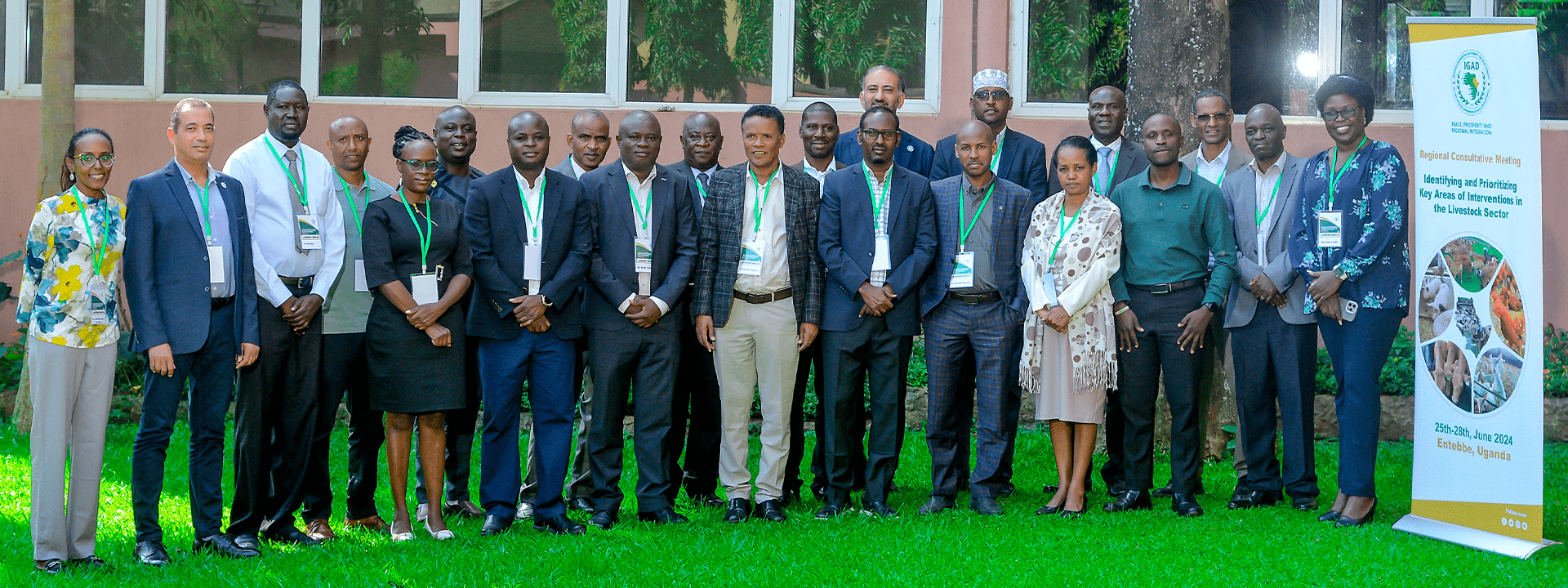June 25, 2024 (ENTEBBE, Uganda): The Food Systems Resilience Program of the Intergovernmental Authority on Development (IGAD) this morning kick started a regional experts meeting in Entebbe, Uganda bringing together key subject matter specialists and organizations specializing in livestock issues in the region to identify and prioritize key areas of interventions in food systems resilience as related to livestock with end goal of coming up with an action plan to harmonize and implement prioritized policy and technical matters in relation to livestock production systems resilience in cross border areas within the IGAD region.
Other objectives of the meeting are to; identify major stakeholders and understanding who is doing what in the areas of livestock on issues of regional importance; prioritize the key transboundary policy and technical challenges that undermine food systems resilience as related to livestock; identify regional policy challenges that require regional cooperation and policy harmonization.
In the welcoming remarks, Dr. Eshete Dejen, Program Manager for Sustainable Development representing Mr. Daher Elmi, Director Agriculture & Environment Division who in his statement highlighted that livestock plays a vital role in the IGAD region because it contributes significantly to the GDP of IGAD Member States.
“The sector supports millions of people, particularly in arid and semi-arid areas by providing income, food, and employment, especially for pastoralist communities. Livestock and livestock products are significant export commodities for IGAD countries, contributing to foreign exchange earnings” Mr. Elmi added.
The Director also underscored that food systems resilience in pastoral areas remains one of the top priorities for IGAD thus establishment of the World Bank supported Food Systems Resilience Program in Eastern and Southern Africa currently being implemented by IGAD.
The opening was officiated by Dr. William Sendaula, the Senior Veterinary Officer, representing the Commissioner of Animal Health of the Ministry of Agriculture, Animal Industry & Fisheries reiterated that food security is a key pillar in a stable community with humans and animals needing access to hazard free food, adequate, nutritious and balanced food to meet their production capabilities.
“As a region, we share common challenges that should be addressed in a holistic manner with a one health approach in mind and concerted efforts from all stakeholders to address barriers to trade within and in international markets as well as transboundary animal diseases like FMD, Brucellosis, aflatoxins etc through agro-industrialization by supporting farmers with vaccines, equipment for processing livestock and livestock products as a way to improve on market access to mention but a few” Dr Sendaula added.
In relation to Dr. Sendaula’s remarks, the meeting will also identify transboundary policy and technical challenges that undermine food systems resilience as related to livestock health (including One-Health approach), production and trade in particular those that require regional cooperation and policy harmonization hence the reason for the action plan as crucial to map who is doing what to build a climate resilience livestock sector in cross-border areas of IGAD region and map out available best practices in transboundary livestock value chain.
It is against this background, that IGAD is well suited to foster collaboration and achieve economies of scale in the region to improve the regional knowledge on aquifers as the basis for future transboundary groundwater management and collaboration. IGAD with funding from the World Bank signed a grant agreement in June 2022 to implement a seven-year program on Food Systems Resilience for Eastern and Southern Africa (FSRP). The FSRP is built on four pillars of (re-)building resilient agricultural production capacity, supporting the sustainable development of natural resources for resilient agricultural landscapes, getting to the market and promoting a greater focus on food systems resilience in national and regional policymaking.
One of the components of FSRP is to build resilient food production capacity of Member States. This involves development of regional and national agricultural systems as well as developing and delivering agricultural technologies and services including livestock production.
The meeting is being attended by different stakeholders that include; International Livestock Research Institute, (ILRI/AICCRA), AU-IBAR, ASARECA, Standards and Trade Development Facility (STDF), FAO SFE – Addis Ababa, IFAD East Africa Regional Office, AfCFTA, AU SAFGRAD, ICIPE, the Ohio State University – Global One Health Initiative (OSU-GOHi), IGAD Centre for Pastoral Areas and Livestock Development (ICPALD), IGAD Sheikh Technical Veterinary School (ISTVS) as well as IGAD technical experts.

